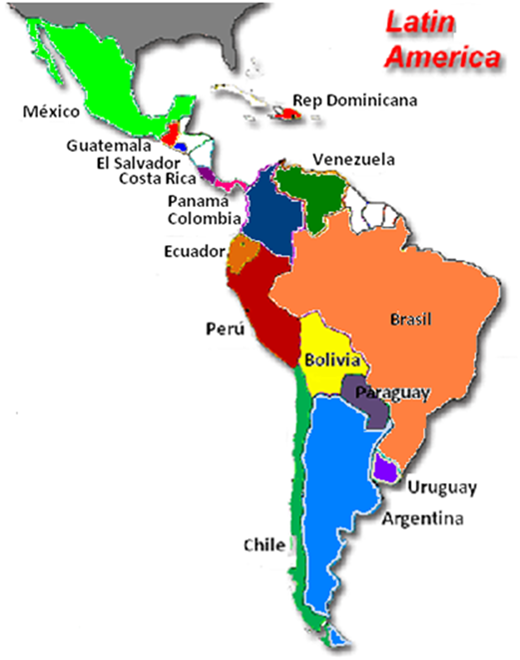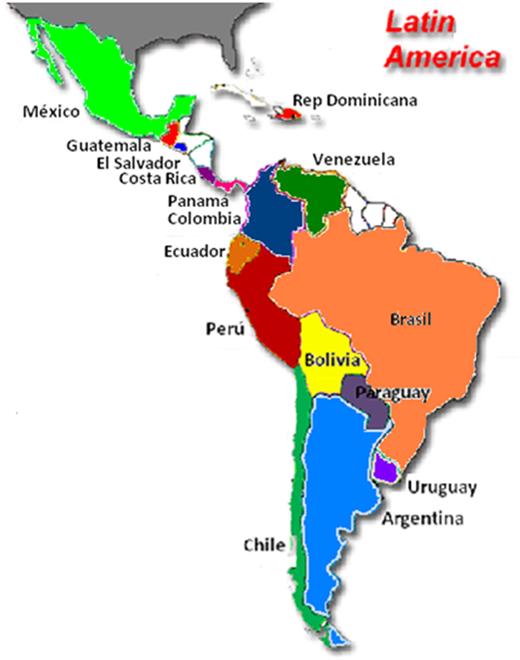Background
Latin America is a group of countries that covers an area of approximately 19 197 000 km2. In 2016, its population was estimated at more than 639 million. The prevalent languages are Spanish and Portuguese.
Myelodysplastic syndromes (MDSs) are a heterogeneous group of myeloid neoplasms characterized by abnormal differentiation and maturation of myeloid cells, bone marrow failure, and genetic instability with enhanced risk of transforming to acute myeloid leukemia.
The incidence rates for MDS in Europe and the United States range from 3 to 5 per 100 000 person-years and increase markedly with age to 20 per 100 000 person-years for those older than age 70 years. Despite the absence of epidemiologic data, Latin America also has an aging population, as with other developed countries, and an increasing rate of secondary MDS from previous toxic exposure not only as a consequence of treating other malignancies but also as a result of environmental or occupational factors. Diagnosis and treatment remain difficult because of the high number of economic and technological disparities within and among Latin American countries.
GLAM group
Latin American Group of Myelodysplastic Syndromes (Grupo Latinoamericano de Mielodisplasia [GLAM]) is a multidisciplinary group of health professionals with these common aims:
To study MDS from its pathogenesis to clinical and therapeutic approaches.
To know our region’s situation regarding MDS.
To work together to improve and encourage local actions.
GLAM was created in close relationships with Latin American hematology societies that considered their own and each other’s rules and interests.
Team
Since 2015, 155 colleagues from 16 Latin American countries have joined GLAM, and 30 of them are considered founder members.
The group has incorporated a variety of professionals, including specialists in biochemistry, immunology, cytogenetics, flow cytometry, hematopathology, and hematology to provide a broad and complementary vision.
The group is integrated and has representatives from most of the countries in Latin America: Argentina, Bolivia, Brazil, Chile, Colombia, Costa Rica, Dominican Republic, El Salvador, Ecuador, Guatemala, Mexico, Panama, Paraguay, Peru, Uruguay, and Venezuela. Together, these countries have nearly 95% of the population of Latin America (Figure 1).
Objectives
Contribute to progress in hematology, specifically in the field of MDS.
Stimulate scientific exchange with other societies.
Organize congresses and scientific symposiums.
Promote publications and regional advisories.
Develop diagnostic and therapeutic guidelines.
Organize Continuing Medical Education programs.
Provide information on MDS and related malignancies to patients and their families.
| Problems and drawbacks . | Aims and projects . |
|---|---|
| 1. Lack of epidemiologic and demographic data; limited access to diagnostic and therapeutic tools | Inquiry or survey every 2 years • Obtain epidemiologic data that could be delivered to health authorities if necessary. • Determine the availability of diagnostic and therapeutic tools. |
| 2. Occasional supervised and centralized MDS updated information | Training and teaching • Update MDS physiopathology, diagnosis, risk systems, new tools, treatment, and research. |
| 3. Scarce cooperative and regional studies | MDS Latin American Registry • Develop an MDS Latin American Registry. |
| 4. Lack of investigational and clinical trials | Investigational and clinical trials • Address absence of alternative therapy after therapy failure. |
| 5. Unsatisfactory support and lack of information for patients and family | Guidelines for patients and caregivers • Form alliance with centers of reference. |
| Actions taken | Results |
| 1. Created surveys. | • The first survey explored real-world clinical practice for MDS in Latin America and showed that access to complementary diagnostic tools, management, and treatment was heterogeneous among 458 participants from 9 countries.1 • Cytometrists from Latin America participated in an online survey that aimed to evaluate the use of flow cytometry in diagnosing MDS. In all, 91 responses from 15 Latin American countries were obtained showing a low compliance with the recommendations. As a consequence, we are developing a consensus adapted to the clinical practice requirements in our region. (In Spanish: https://es.surveymonkey.com/r/WVG87YC; In English: https://es.surveymonkey.com/r/W7L7LY3). |
| 2. Provided training via meetings, symposiums, and online courses. | • MDS academic meetings and MDS symposiums were periodically organized in different Latin American countries: 2007: Fortaleza, Brazil; 2009: Buenos Aires, Argentina; 2011: Cartagena, Colombia; 2013: Isla Margarita, Venezuela; 2016: Lima, Perú; and 2018: Cancún, México. • Distant MDS Online Course was offered in 2017-2018, available in Spanish and Portuguese. It was accessed by 206 physicians. • An MDS training scholarship was provided for young hematologists, and interchange programs were implemented among different countries in Latin America. Initial experiences: Costa Rica-Argentina and Panama-Brazil. |
| 3. Created and maintained a Latin American Registry for MDS. | • A Latin American Registry has been in progress since 2017; some MDS registries are working locally. • Argentina (Argentinean Hematology Society [RAEH], http://www.registros-sah.com.ar) • Mexico (Mexican Group for the Study of Hematology [AMEH], http://www.amehac.org/) • Peru (Peruvian Hematology Society [SPH], http://sph-peru.org/) • Brazil (Brazilian Bone Marrow Transplantation Society [SBTMO], http://tmo.med.br) |
| 4. Encouraged the development of clinical trials and provided a Web page. | • Encourage and promote investigations and clinical trials. • Hypomethylating treatment in MDS and chronic myelomonocytic leukemia is a multicenter, open and active study in the real world.2,3 |
| 5. Provided information. | • GLAM web page and guidelines for patients and caregivers will provide useful information about MDS and contact information to patients and support groups. Available at http://www.grupoglam.org/ |
| Problems and drawbacks . | Aims and projects . |
|---|---|
| 1. Lack of epidemiologic and demographic data; limited access to diagnostic and therapeutic tools | Inquiry or survey every 2 years • Obtain epidemiologic data that could be delivered to health authorities if necessary. • Determine the availability of diagnostic and therapeutic tools. |
| 2. Occasional supervised and centralized MDS updated information | Training and teaching • Update MDS physiopathology, diagnosis, risk systems, new tools, treatment, and research. |
| 3. Scarce cooperative and regional studies | MDS Latin American Registry • Develop an MDS Latin American Registry. |
| 4. Lack of investigational and clinical trials | Investigational and clinical trials • Address absence of alternative therapy after therapy failure. |
| 5. Unsatisfactory support and lack of information for patients and family | Guidelines for patients and caregivers • Form alliance with centers of reference. |
| Actions taken | Results |
| 1. Created surveys. | • The first survey explored real-world clinical practice for MDS in Latin America and showed that access to complementary diagnostic tools, management, and treatment was heterogeneous among 458 participants from 9 countries.1 • Cytometrists from Latin America participated in an online survey that aimed to evaluate the use of flow cytometry in diagnosing MDS. In all, 91 responses from 15 Latin American countries were obtained showing a low compliance with the recommendations. As a consequence, we are developing a consensus adapted to the clinical practice requirements in our region. (In Spanish: https://es.surveymonkey.com/r/WVG87YC; In English: https://es.surveymonkey.com/r/W7L7LY3). |
| 2. Provided training via meetings, symposiums, and online courses. | • MDS academic meetings and MDS symposiums were periodically organized in different Latin American countries: 2007: Fortaleza, Brazil; 2009: Buenos Aires, Argentina; 2011: Cartagena, Colombia; 2013: Isla Margarita, Venezuela; 2016: Lima, Perú; and 2018: Cancún, México. • Distant MDS Online Course was offered in 2017-2018, available in Spanish and Portuguese. It was accessed by 206 physicians. • An MDS training scholarship was provided for young hematologists, and interchange programs were implemented among different countries in Latin America. Initial experiences: Costa Rica-Argentina and Panama-Brazil. |
| 3. Created and maintained a Latin American Registry for MDS. | • A Latin American Registry has been in progress since 2017; some MDS registries are working locally. • Argentina (Argentinean Hematology Society [RAEH], http://www.registros-sah.com.ar) • Mexico (Mexican Group for the Study of Hematology [AMEH], http://www.amehac.org/) • Peru (Peruvian Hematology Society [SPH], http://sph-peru.org/) • Brazil (Brazilian Bone Marrow Transplantation Society [SBTMO], http://tmo.med.br) |
| 4. Encouraged the development of clinical trials and provided a Web page. | • Encourage and promote investigations and clinical trials. • Hypomethylating treatment in MDS and chronic myelomonocytic leukemia is a multicenter, open and active study in the real world.2,3 |
| 5. Provided information. | • GLAM web page and guidelines for patients and caregivers will provide useful information about MDS and contact information to patients and support groups. Available at http://www.grupoglam.org/ |
Main actions developed
Acknowledgments
The authors thank all members of GLAM and the 16 Latin American Societies of Hematology.
Authorship
Conflict-of-interest disclosure: S.U. has been a speaker for Novartis and Bristol Myers Squibb and has been on an advisory board for Novartis, Roche, and Abbvie. B.G. has been a speaker for United Medical, Janssen, and Amgen. J.R. has been a speaker for Novartis, Amgen, Tecnofarma, Alexion, and Sanofi/Genzyme. F.H. has been a speaker for Roche, Novartis, and Takeda. All other authors declare no competing financial interests.
Corresponding author: Renée Crisp, Hospital Nacional Prof. A. Posadas, Buenos Aires, Argentina; e-mail: reneecrisp@gmail.com.
Address for Latin-American MDS Group: Uruguayan Society of Hematology (on behalf of GLAM), Colonia 1086 Of. 404, Montevideo, Uruguay; secretaria@grupoglam.org; http://www.grupoglam.org/.



